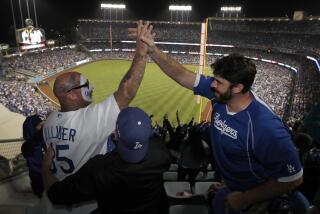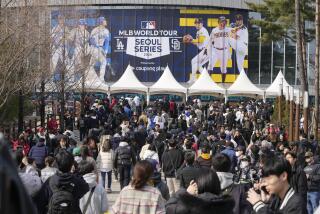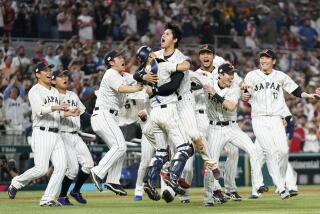Out of Olympics, Baseball Plans a Real World Series
- Share via
DETROIT — Less than a week after their sport was ousted from the Olympics, Major League Baseball executives used this week’s All-Star game festivities as a platform to unveil detailed plans for an international tournament of their own.
The inaugural World Baseball Classic will be held in March 2006, organizers said Monday, the competition featuring a U.S. squad composed of professional players and teams from 15 other nations, many with professional stars of their own.
For more than 20 years, Major League Baseball has pushed to take its game global. The tournament marks a broad move into the worldwide marketplace, announced only three days after the International Olympic Committee voted to drop the sport from the Summer Games after 2008.
Many within baseball had complained about the IOC decision, but Commissioner Bud Selig put a different spin on it.
“I don’t know if frankly I consider it a blow,” Selig said on the eve of the All-Star game. “I’m sorry they made the decision, but we’re moving on in a very dramatic way to internationalize the sport.”
IOC spokeswoman Giselle Davies, asked about the new world tournament, said: “Baseball is still an Olympic sport. We’ll be working closely with them through 2008. And developments in their sport are always followed by the IOC.”
Monday’s news conference featured Major League Baseball players from various lands who said they would represent their home teams.
Jason Bay of Canada, Carlos Beltran of Puerto Rico, Andruw Jones of the Netherlands Antilles (Curacao) and Dontrelle Willis of the U.S. were among those in attendance.
“I just hope I make the team,” Willis said.
Miguel Tejada told reporters that fans in his home, the Dominican Republic, would welcome the competition.
“Now they’re going to see all the [Dominicans] playing together on one team,” he said. “I know they’re going to be really excited.”
The tournament -- to be played again in 2009, then every four years thereafter -- would take place during the first three weeks of March, finishing just before the NCAA men’s basketball tournament reaches its peak.
Previously, team owners and the Major League Baseball Players Assn. had resisted the notion of pausing midseason every four years to allow stars to join their national teams for the Summer Olympics, as the National Hockey League has done for the Winter Olympics.
Some IOC members suggested last week that the absence of big-name players in the Olympic Games was at least partly responsible for the sport being dropped.
The World Baseball Classic will occur at a time when players are otherwise stretching, sunning and working out the kinks in spring training.
With all the major stars theoretically available, baseball could have a scaled-down version of soccer’s popular World Cup.
“This is really part of an integrated marketing plan related to the global development of baseball,” said Paul Swangard, managing director of the Warsaw Sports Marketing Center at the University of Oregon. “This was a missing ingredient.... Nothing else is going to provide that. It makes sense for baseball to do it itself.”
But not everyone was thrilled with the idea.
It was unclear whether Cuba, which might fear defections, would participate, baseball executives said. Japanese baseball officials are concerned about ownership of the tournament, and the Japanese players’ association hasn’t given its approval.
Major league owners and the players association would “jointly govern” the 18-day competition, essentially owning an event they foresee growing into an international spectacle.
Although North America, Latin America and Asia are the sport’s hotbeds, a recent IOC report said that 112 countries have national baseball federations.
The Japanese have raised concerns about Major League Baseball and the players union having so much control over an global event. In contrast, soccer’s World Cup is overseen by FIFA, the sport’s international governing body.
“Some already have accused us of being too dominant in the conduct of this event, and we’re sensitive to that,” said Gene Orza, chief operating officer of the players association.
According to baseball executives, 47% of net proceeds will go to prize money for the teams. The remainder will be divided among Major League Baseball, the players union, the International Baseball Federation and other organizations.
As for the players, none will be guaranteed money for participating, though they may be paid by their national federations. Major league players will continue to receive their normal spring training per diem.
Another sore point with the international sports community has been Major League Baseball’s failure to embrace Olympic-style drug testing, under which athletes are banned from competition for two years for a first offense. A second offense brings a lifetime ban.
The players association, which continues to fight implementing Olympic-style rules for its own league, has agreed to a stricter testing regimen for the world tournament.
The 27-man teams will be selected by the respective national federations.
The first round of play, beginning March 3, will be held in the U.S., Latin America and Asia. The second round will be in the U.S. and Latin America.
The semifinals and finals will take place in the United States.
Dodger Stadium, scene of the 1984 Olympic baseball tournament, Angel Stadium and Petco Park in San Diego are among the sites under consideration for those games.
“This is a beautiful thing,” said Willis, of the Florida Marlins. “This is going to bring baseball to everyone’s doorstep internationally.”
*
Brown reported from Detroit, Wharton from Los Angeles. Times staff writer Bill Shaikin and Alan Abrahamson contributed to this report.
*
(BEGIN TEXT OF INFOBOX)
Tournament plan
*--* An overview of the 16-nation, 18-day World Baseball Classic:
Opening round (2006):
Consists of four pools of four teams each. After two round-robin rounds, the top two teams from each pool advance to compete for semifinal berths.
Group A (Play begins: March 3) Teams: Japan, South Korea, Taiwan, China Site: Tokyo or Taiwan
Group B (Play begins: March 8) Teams: United States, Mexico, Canada, South Africa Site: United States
Group C (Play begins: March 8) Teams: Cuba, Puerto Rico, Panama, the Netherlands Site: Latin America
Group D (Play begins: March 8) Teams: Dominican Republic, Venezuela, Australia, Italy Site: Florida
Semifinals: (Play begins: March 18) Sites: United States and Latin America
Championship Game: (Play begins: March 20) Site: United States *--*
Source: Associated Press
More to Read
Go beyond the scoreboard
Get the latest on L.A.'s teams in the daily Sports Report newsletter.
You may occasionally receive promotional content from the Los Angeles Times.







